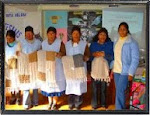
Fair Trade USA, the only third-party fair trade-certifier in the U.S, has launched a clothing certification that guarantees consumers that the clothing they purchase was not made in a sweatshop.
Heather Franzese, Senior Category Manager for Apparels and Linens at Fair Trade USA has led the development of international fair trade garment certification standards, meeting with cotton farmers and garment factory owners all over the world. I was told by the company that “On any given day, she might Skype with or visit in person workers and factories in India, Peru, Liberia, El Salvador, Guatemala, Bangladesh, Costa Rica, or Nicaragua. She can speak about Fair Trade garments from the perspective of a worker, a factory owner, a cotton farmer and a U.S garment business owner.”
Pretty impressive.
Both the farms where the cotton is grown and the factories where the clothing is sewn are inspected and certified to ensure that there are both better working conditions and higher incomes for both farmers and traditionally underpaid garment workers.
Hopefully, Fair Trade USA will eventually work with the U.S where many farmers and garment factory workers stateside could use the help as well.
I caught up with Franzese to find out more about the launch of the certification for garments and textiles currently being set up in underdeveloped countries. Here’s what she had to say:
When did you launch the new certification?
Fair Trade Certified clothing is brand new in the U.S. The pilot standards for Fair Trade factories were published in March 2010 after several years in development. During a public comment period last year, we heard from 55 organizations in 15 countries and incorporated that input into the certification standards and process.
What brands have joined on as part of the certification?
A dozen pioneering companies have committed to launch Fair Trade Certified apparel and house wares. Organic pioneers like Maggie’s Organics and Indigenous Designs, as well as brand new eco-fashion brands like Liberty & Justice, which produces tees at a factory in Liberia that focuses on women’s empowerment.
READ THE FULL ARTICLE IN ECOSALON





